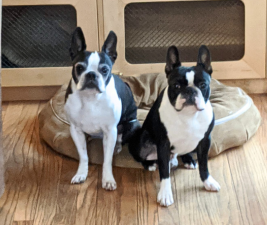We got some rather unwelcome news this week. Fran took Booker, her 10-year-old Boston Terrier to the veterinarian because he was squinting. He has an eye owie and is sporting the cone of shame for a bit. That wasn’t the unwelcome bit. He also gained almost four pounds over the winter. Booker is a fat dog.
That’s huge for a Boston Terrier. He was a bit skinny at his agility competition weight of about 19 lbs. But for him to have put on three plus, without us even noticing? We were shocked.
Perpetual motion dogs
We’ve had Bostons most of our lives and keeping them trim has never really been an issue. Ours have pretty much always been perpetual motion machines, using up any and all calories offered. Our second Boston, Daemon, would always be 21 lbs when weighed in the Spring, and 19 in the Autumn. Running around in the summer sun is always good for staying in shape.
We’re thinking that Booker is on the same trajectory, now that he’s considered a senior dog. When he was actively competing in agility and obedience, classes, travel, and practice sessions kept him pretty busy through the week. He still plays daily training games, of course. But now that he’s retired, his schedule isn’t as full or active as it once was.
Just like us
There’s also the whole “winter weight” factor. It wasn’t a particularly cold winter around here, but it was dark and wet much of the time. Neither of those makes anybody around here eager to get out for nice, long walks. So we may have slacked off a bit.
Now that there’s a hint of warmer weather (or there was yesterday, anyway), we’ll be getting out more with our dogs. The long, sniffy-walks will reappear. That will help some.
We’re also old pros at keeping our dogs’ weight in check. We’ve had many dogs who were “easy keepers” – Golly in particular was one who could look at food and gain weight.
So we’ve developed lots of “tricks” to keep our dogs’ appetites satisfied, while still reducing their calorie intake.
On the menu
Frozen green beans are a major player in doggie diets around here. If you replace a portion of high-calorie kibble or other food with an equal volume of frozen green beans, your dog gets fewer calories and the same, if not more, bulk.
We’re not sure dogs actually notice how full their bowls are, but we suspect they know exactly how high the food is supposed to be in each bowl. If it’s a little lower than usual, they will give us a suspicious look, at the very least.
Another technique is to use part of their food for training treats, instead of higher-calorie treats. We also use a variety of treats for training, making a kind of “trail mix” of different things. Lower-calorie treats we use include Cheerios, air-popped popcorn, celery slices, and again, frozen green beans.
Take your time
As long-time veterans of the battle of the bulge, for ourselves and our dogs, the best advice is to take it slow. Fat dogs didn’t gain weight overnight, and they don’t lose it that way, either. Not if they’re healthy, anyway. Booker’s weight gain was so gradual that we didn’t even notice it happening. Now that we know better, we’ll do better.
Enjoyed this post? Click here to sign up for the weekly newsletter and never miss another!
















I just want to point out that Cheerios ARE NOT a good replacement. First of all, they contain high amounts of the
chemical glyphosate. Second, studies have shown that glyphosate accumulates in our systems and CAUSES
weight gain. And most holistic vets will tell you that grains in and of themselves are not good for canines.
Thank you for the information!